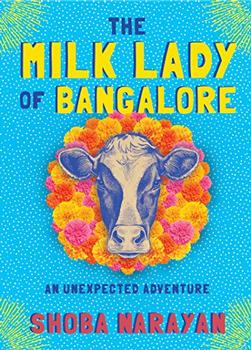Page 2 of 4
There are currently 25 member reviews
for The Milk Lady of Bangalore
-
Linda S. (Milford, CT)
The Milk Lady of Bangalore
You are in for a treat when you start this book by Shoba Narayan. Ms. Narayan, after much soul searching decides to leave Manhattan and return to India with her husband and two children. Mainly so her children will grow up with their grandparents nearby. The book is full of interesting facts, as well as humorous and engaging ones. For instance, I did not know that cows are sensitive to their owner's feelings. And they are sacred to Hindus. Through her friendship with the milk lady, Sarala, many comical events occur. Sarala is paid to have her cow 'christen' a new apartment by making a 'deposit' on the floor. It's quite a trick getting her into the elevator.
Shoba and Sarala spend much time bartering for things they each want from the other. It took Shoba much deliberation and convincing from Sarala to agree to try buying fresh cow's milk. But she does and everyone is happy. This was a thoroughly enjoyable book, learning about the lives of two very diverse women.
-
Judith G. (Ewa Beach, HI)
History with a smile
Interesting combination of historical information re: cows in India, interspersed with laugh-out-loud moments. You will fall in love with an enormous variety of cows, the Milk Lady herself, and the author. I want to order it for friends when it is published in January. Truly a GOOD READ.
-
Kenan R. (Liberty, MO)
Who Knew?
I was initially a little disappointed to discover the book I had selected was not a novel. That did not last long. Populated with true "characters" and a wealth of cultural and dairy information I was hooked almost immediately. The book is ostensibly about cows and their place in Hindu culture, but it's really about unexpected friendships and the things that matter to us as we get older. It turns out you CAN go home again, and it can feed and enrich your life tenfold if you let it. Great read!
-
Beverly D. (Palm Harbor, FL)
COWS !!! Who knew???
What a delightful and "unexpected adventure". The author's return home after years in NYC offer a perfect opportunity to educate both her daughters, AND us on some of the more interesting customs and beliefs of the Hindu religion specifically and India in general. Cows are an integral part of everyday life and we learn why through Narayan's friendship with the milk lady, Sarala. Their daily interactions give an insight into the give and take that makes India...India. Highly recommended.
-
Lee M. (Creve Coeur, MO)
Do Cows Smile
The price of milk, the price of cows, the price of friendship, all are superbly explored in this book. Some basis in fact, I believe, the narrative is enlivened by Ms. Nayaran's mischievous sense of humor. Her research regarding the customs and traditions about cows, languages, and other 'only in India' information is a great plus. I thought the first half of the book could have been tightened a bit so more of a 4.5 instead of a solid 5. Heartily recommend.
-
Nicole S. (St. Paul, MN)
I'm not quite sure how I feel about the book
Part of me really enjoyed the book. It opens to a world that I have no knowledge of and it also is through an adept guide's eyes. The problem is that the story just did not completely capture me. It feels like the author is unsure of so much, concepts of home, complicity in an uneven economic (and therefore relationship) situation, and her place in the world. She touches on her discomfort but doesn't really dive in. She also stops her narrative to add professorial information about her subject matter. It's both interesting and also disruptive to the story. Still, I learned quite a bit about a lot of topics and felt v. ready to read more about India.
-
Viqui G. (State College, PA)
Cows and Milk of India
In this intriguing book, Shoba Narayan introduces to the reader her love of her homeland of India and especially the cows of India. The relationship at the core of the book is between the author and Sarala, the "Milk Lady of Bangalore". Sarala sells her milk on a street corner near the author's apartment. Through this friendship, we learn abundant details about different types of cows, their unique milk flavor and consistency as well as the reverence that the Indian people have for everything bovine (including cow urine and dung). Although this book was entertaining to read, the stark (and sometimes shocking) cultural contrasts between India and the US were my most memorable impressions.
